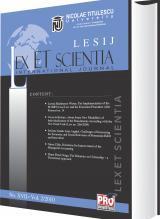THE ROLE OF THE EUROPEAN UNION CHARTER OF FUNDAMENTAL RIGHTS IN THE NEW EUROPEAN CONTEXT
THE ROLE OF THE EUROPEAN UNION CHARTER OF FUNDAMENTAL RIGHTS IN THE NEW EUROPEAN CONTEXT
Author(s): Oana-Mihaela SalomiaSubject(s): Law, Constitution, Jurisprudence
Published by: Universitatea Nicolae Titulescu
Keywords: autonomy; rights; courts; institutions; European Convention
Summary/Abstract: The Charter of fundamental rights of the European Union was proclaimed by the European Commission, the European Parliament, and the Council of the European Union at the European Council held at Nice on the 7 December 2000, was modified on 12 December 2007 at Strasbourg, and, today, according to article 6 in the Treaty on European Union, the Charter gained the juridical value of an constitutive European treaty. The way it has been conceived, the content of the Charter reflects the Union’s desire for the autonomy of the juridical order. The Charter clearly states the fact that it solely seeks to protect the fundamental rights of the individuals with regard to acts undertaken by the EU institutions and by the member states in applying of the Union treaties. A protocol to Lisbon Treaty introduces specific measures for the United Kingdom and Poland seeking to establish national exceptions to the application of the Charter. The new treaty provides a new legal basis for accessing of the Union to the European Convention on the Protection of Human Rights and Fundamental Freedoms.
Journal: LESIJ - Lex ET Scientia International Journal
- Issue Year: XIX/2012
- Issue No: 2
- Page Range: 180-186
- Page Count: 7
- Language: English

